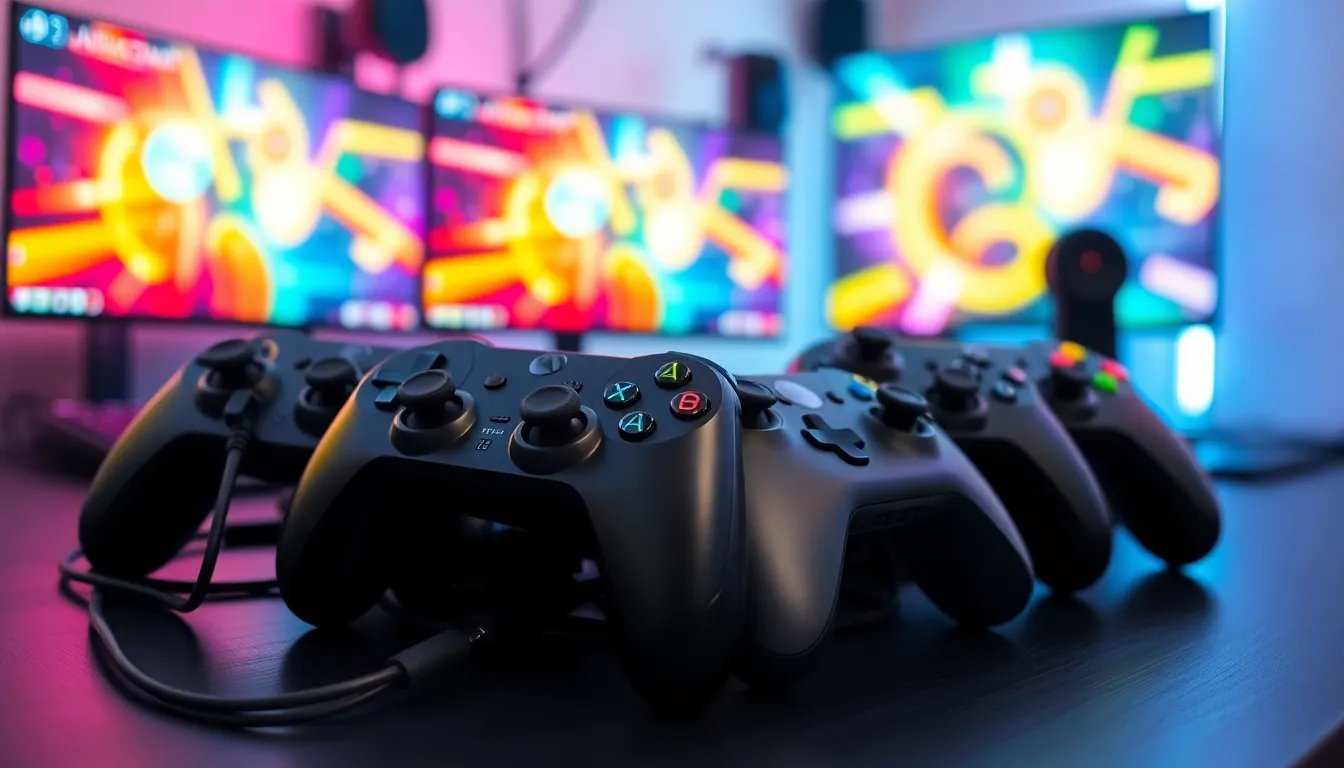In the world of gaming, the controller is a player’s best friend—more reliable than that one buddy who always forgets snacks. Whether it’s a high-stakes battle or a cozy adventure, the right gaming controller can make all the difference. With options ranging from sleek designs to customizable features, they’re not just tools; they’re gateways to immersive experiences.
Table of Contents
ToggleOverview of Gaming Controllers
Gaming controllers serve as vital tools for players, enhancing the overall gaming experience. Various types exist, catering to different preferences and gaming styles. These devices support traditional console gaming, PC gaming and mobile gaming, ensuring accessibility for all types of gamers.
Wired controllers typically provide a direct connection to the console or PC, minimizing input lag. Wireless options gain popularity, allowing freedom of movement while maintaining reliable connectivity. Controllers often feature customizable buttons and layouts, which enable players to tailor their gaming experience to their needs.
Ergonomics play a significant role in controller design, enhancing comfort during extended play sessions. Well-designed grips and weight distribution contribute to better handling and control. Many controllers also include advanced features, such as motion sensors and touchpads, enriching gameplay options.
Compatibility remains an essential aspect, as many controllers support multiple devices, making them versatile tools. Third-party controllers often offer unique features and designs, appealing to gamers seeking something different. The choice of gaming controller impacts the gameplay experience, influencing player performance and enjoyment.
Customization remains a trend in today’s gaming world. Players frequently personalize controllers with skins, stickers and enhanced grips, making them unique. Gamers enjoy expressing their individuality, resulting in unique controllers that reflect personal style.
Types of Gaming Controllers

Gaming controllers come in various types, each designed to enhance gameplay according to user preferences and device compatibility.
Wired Controllers
Wired controllers offer reliable performance with minimal input lag, making them ideal for competitive gaming. Players often choose these options for their straightforward connection, ensuring consistent power and responsiveness. Many modern wired controllers feature ergonomic designs, which enhance comfort during long gaming sessions. These controllers typically support multiple platforms, including PC and console systems, making them versatile choices for gamers. Additionally, gamers appreciate the durability of wired controllers, as they’re resistant to battery-related issues.
Wireless Controllers
Wireless controllers provide freedom of movement, allowing players to sit comfortably without being tethered to their devices. Advanced wireless technology reduces latency, ensuring a seamless gaming experience. Many options come with rechargeable batteries, promoting sustainability while eliminating the need for constant battery replacements. Players enjoy the sleek designs and customizable features often found in wireless controllers, which add to their appeal. Compatibility remains a significant factor, with many wireless controllers designed to work across various platforms, enhancing their usability.
Features to Consider
Choosing the right gaming controller requires attention to specific features that enhance performance and comfort. Key aspects include ergonomics, compatibility, and customization options.
Ergonomics
Controllers must fit comfortably in hands during prolonged gaming sessions. An ergonomic design promotes better grip and reduces fatigue. Controllers with textured grips often prevent slipping, allowing for more precise movements. Shape and button placement significantly affect accessibility and speed of response. Finally, lightweight options can further enhance comfort, catering to varied gaming preferences.
Compatibility
Compatibility plays a crucial role in selecting a gaming controller. Many controllers support multiple platforms, including consoles, PCs, and mobile devices. Assessing cross-platform functionality can simplify the gaming setup. Some models even offer unique features specific to certain devices, enhancing gameplay experiences. Players should verify compatibility requirements to ensure smooth operation across different systems.
Customization Options
Customization options allow players to personalize their controllers according to their preferences. Many controllers feature interchangeable thumbsticks and buttons, enabling tailored configurations. Skins, decals, and unique color choices can express individual style while maintaining functionality. Players may also find software that permits remapping buttons for specialized game strategies. Ultimately, these features create a distinctive gaming tool that reflects personal identity.
Popular Gaming Controllers on the Market
Gaming controllers come in various forms to enhance player experiences across platforms. Some of the most sought-after options include Xbox controllers, PlayStation controllers, and several innovative third-party models.
Xbox Controllers
Xbox controllers are known for their ergonomic design and sturdy build. The Xbox Series X controller features textured grips and a hybrid D-pad, improving performance during gameplay. Multiple connectivity options enable seamless use across PCs. Players benefit from a wide compatibility range, as these controllers connect effortlessly with various devices, enhancing flexibility. Customization options exist, allowing gamers to personalize button mapping through Xbox Accessories App.
PlayStation Controllers
PlayStation controllers offer unique features, especially with the DualSense model. Haptic feedback and adaptive triggers provide immersive sensations during gameplay. The design emphasizes comfort, making it suitable for long gaming sessions. Compatibility stretches across PlayStation consoles, while also offering limited PC support. Players can personalize their controllers with various colors and designs available through PlayStation Store.
Third-Party Options
Third-party options cater to gamers seeking alternatives and unique features. Brands like Razer and Scuf provide customizable controllers that enhance performance and ergonomics. Customizable features may include adjustable trigger sensitivity and remappable buttons, catering to competitive gamers. Many of these controllers focus on sleek designs while maintaining comfort. Compatibility remains high, as they often support multiple platforms, ensuring versatility for diverse gaming experiences.
Future Trends in Gaming Controllers
Emerging technologies shape the next generation of gaming controllers. Enhanced haptic feedback offers more immersive experiences by simulating environmental sensations through vibration. Adaptive triggers provide varied resistance levels, allowing players to feel different actions during gameplay.
Growing interest in cloud gaming also influences controller design. Many developers focus on creating controllers that connect seamlessly to multiple devices, enabling users to play across platforms easily. This adaptability meets the needs of the increasingly mobile gaming community.
Customization continues its rise as a priority for gamers. Modular controllers, featuring interchangeable components and adjustable layouts, provide personalization options tailored to individual playstyles. Custom software now allows players to remap buttons, maximizing efficiency in fast-paced environments.
Sustainability plays a role in future designs. Manufacturers are exploring eco-friendly materials for constructing controllers, addressing awareness of environmental issues. This shift reflects a growing emphasis on responsible gaming practices.
Additionally, artificial intelligence integration improves user experiences. Intelligent controllers can analyze gameplay patterns, offering insights to enhance performance. Machine learning capabilities enable controllers to adapt to player preferences over time, creating a personalized gaming experience.
The addition of voice commands allows gamers to interact hands-free. Voice-enabled features streamline gameplay by facilitating quick actions or navigation through menus without interrupting the action.
Virtual reality standards continue to evolve, necessitating controllers that support immersive experiences. Haptic feedback and motion tracking collaborate to create realistic interactions in virtual environments, expanding the possibilities for gamers.
Future gaming controllers focus on enhancing gameplay through technology, sustainability, and versatility. As advancements occur, the gaming community enjoys a broader range of options that cater to individual preferences and improve overall engagement.
Gaming controllers play a pivotal role in shaping the overall gaming experience. Their design and functionality cater to a wide range of preferences and styles, ensuring every player finds the perfect match for their needs. Whether opting for wired reliability or the freedom of wireless technology, gamers benefit from enhanced performance and comfort.
As the industry evolves, future gaming controllers promise even more innovation. With advancements in haptic feedback, customization, and sustainability, players can expect tools that not only enhance gameplay but also reflect their personal style. The ongoing development in this space ensures that gaming controllers will continue to be essential companions in every adventure.




